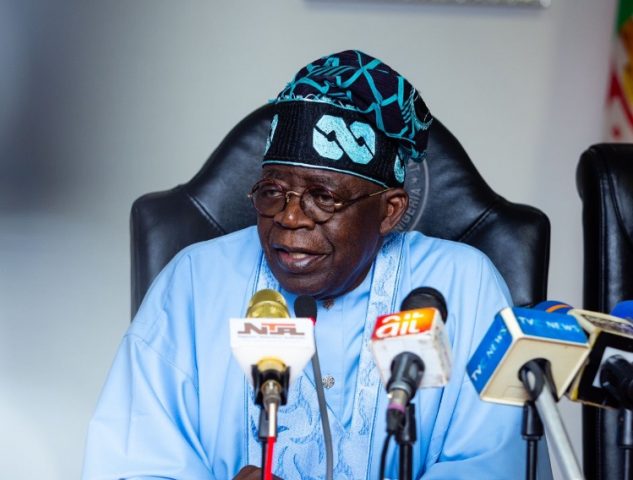Tinubu’s Two-Year Review Triggers Intense Political Debate…President Bola Ahmed Tinubu’s mid-term review of his administration has sparked a fierce political storm across Nigeria, as reactions continue to pour in over his claims of progress in tackling economic and security challenges.
While the president highlighted significant policy decisions and strides made under his leadership, opposition voices and critics have pushed back, questioning the actual impact of his reforms on the lives of ordinary Nigerians.
In his address marking two years in office, Tinubu touted his administration’s bold economic reforms, including the removal of fuel and electricity subsidies, unification of exchange rates, and a shift in fiscal policy aimed at reducing Nigeria’s budget deficit.
He claimed these steps were crucial to pulling the country back from the brink of financial collapse.
According to Tinubu, the fiscal deficit has dropped from 5.4 percent of GDP in 2023 to 3.0 percent in 2024, which he described as a major milestone.
He also pointed to improvements in oil production and signs that inflation may be starting to ease.
However, critics have pushed back on the president’s optimistic tone, noting that the daily realities of most Nigerians tell a different story.
The cost of living remains extraordinarily high, with food prices continuing to soar and inflation eroding incomes.
Many Nigerians argue that the removal of subsidies has brought more hardship than relief, particularly in urban centers where transportation and utility costs have surged.
READ MORE:Mid-Term: Buhari Praises Tinubu’s Leadership, Urges Nigerians to Tame Expectations
Despite official claims of inflation stabilizing, the World Bank and other observers continue to warn that high inflation remains one of the country’s most pressing problems, with millions still struggling to afford basic necessities.
The security situation has also been a point of contention. Tinubu, in his review, stated that his government has made gains in reducing banditry in the northwest and that farmers who were previously displaced are gradually returning to their land.
He emphasized that security agencies are working more effectively and that the nation is seeing the results of improved coordination among law enforcement bodies.
But human rights organizations and political analysts have criticized what they describe as a glossing over of persistent violence.
Amnesty International recently reported that over 10,000 people have lost their lives due to violence, insurgency, and criminal activities since Tinubu took office in 2023.
The president’s extended stay in Europe during a recent wave of rural attacks drew particular criticism, with many Nigerians and opposition figures questioning the administration’s commitment to addressing domestic security threats.
They argued that such an absence sends the wrong signal at a time when national leadership is needed most.
Social media erupted with criticism, and several civil society groups condemned the timing of the trip, saying it demonstrated a disconnect between the presidency and the daily struggles of citizens.
On the political front, the ruling All Progressives Congress (APC) added fuel to the growing fire by formally endorsing Tinubu for a second term in the 2027 general elections.
While the party leadership praised Tinubu’s economic reforms and described his leadership as transformative, the move was met with skepticism by the opposition and sections of the public.
Many questioned the timing of the endorsement, seeing it as premature and politically calculated, especially as the nation grapples with economic and security challenges.
Public sentiment remains sharply divided. Supporters of the president argue that tough reforms are necessary to build a more stable and self-sufficient economy in the long run.
They say the initial pain will give way to progress if Nigerians remain patient.
However, a growing number of citizens and advocacy groups say they are yet to feel the benefits of the reforms and are calling for more direct government intervention to cushion the economic blows being felt across the country.
As Nigeria looks ahead to the second half of Tinubu’s term, the political temperature continues to rise.
Whether the president can regain broader public trust and translate his policies into visible improvement in people’s lives remains a question that will likely shape the political landscape leading up to 2027.




